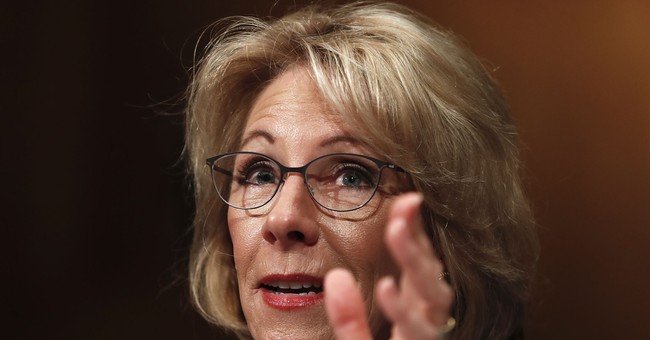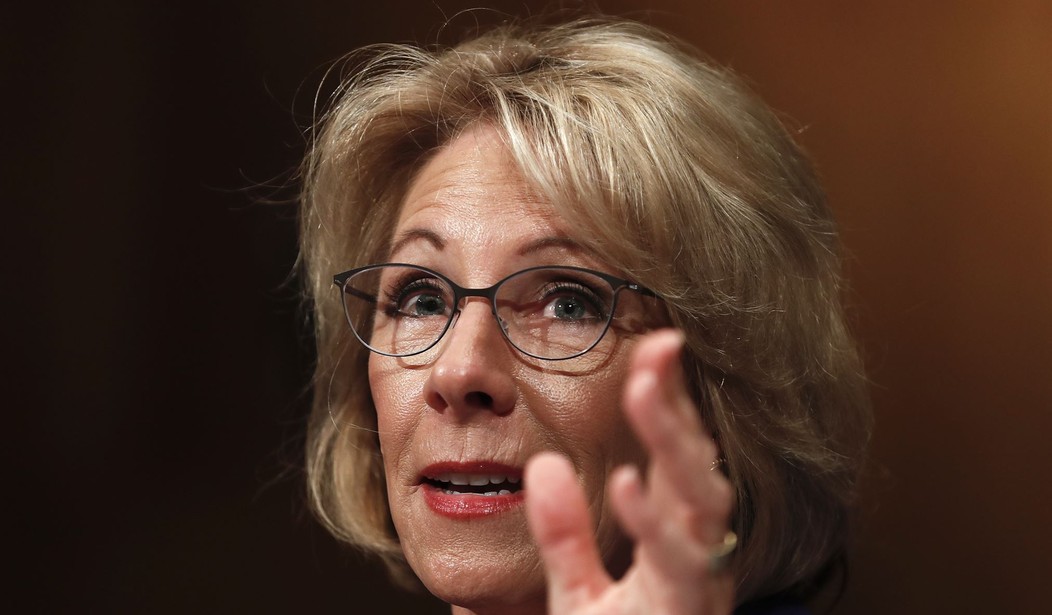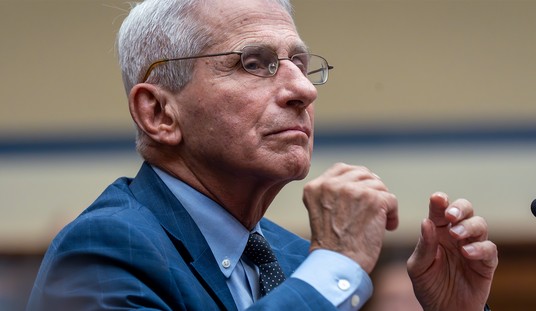
One of the many priorities facing Betsy DeVos when she assumed control of the reins as Department of Education was rescinding or drastically revising the fascistic rules regarding how schools must handle allegations of sexual misconduct as articulated by the infamous ‘dear colleague’ letter sent out by the Obama Education Department (see Betsy DeVos Is Poised to Rescind Obama’s Fascist Sex Abuse Investigation Guidelines).
Under that guidance, the accused had no right to know the allegations against him, he had no right to confront the accuser, a single college official acted as prosecution, defense, judge, and jury. If someone witnessed something they considered to be sexual harassment, even though both parties (or all three if you are former member of Congress from California) denied anything non-consensual happened, you were required to report it and that triggered an investigation. A Colorado State University-Pueblo football player was suspended over a consensual sexual relationship with his girlfriend to which a third party objected. The accused could have a lawyer but they were forbidden from speaking during the proceedings.
This, to be charitable, is not a system of jurisprudence that should be permitted anywhere in the United States. It is certainly not a system that should be imposed upon our entire educational system. A little earlier today, Department of Education withdrew that system that would have made Lavrentiy Beria evious.
The U.S. Education Department has finalized campus sexual assault rules that bolster the rights of accused students and narrow the definition of sexual harassment. At least one advocacy group is planning a legal challenge. https://t.co/2ZN3FScX8o
— The Associated Press (@AP) May 6, 2020
Here is Robbie Soave from Reason who has made this calculated abuse of male students a cause:
The new rules are similar to what the Department of Education proposed in November 2018. Most notably, the government has abolished the single-investigator model, which previously permitted a sole university official to investigate an accusation of misconduct, decide which evidence to consider, and produce a report recommending an outcome. Under the new rules, the final decision maker must be a different person than the investigator, and a finding of responsibility can only be rendered after a hearing in which a representative for the accused is able to pose questions to the accuser—i.e., cross-examination.
Importantly, the new rules narrow the scope of actionable sexual harassment to exclude conduct that ought to be protected under the First Amendment. Obama-era guidance had defined sexual harassment as “any unwelcome conduct of a sexual nature.” The new rules keep this definition but add that the conduct must be offensive to a reasonable person, severe, and pervasive. In practice, this should mean that schools will no longer initiate Title IX investigations that impugn free speech.
“This new rule strikes a powerful blow against campus censorship,” said a Department of Education spokesperson. “Campus free speech must not be sacrificed in the misguided pursuit of any other value.”
The new rules will also end the pernicious practice of universities initiating Title IX investigations in cases where the alleged victims are not interested in this course of action. Under previous guidance, any university official who became aware of a potential Title IX issue had to report it, thus triggering an investigation. Under the new guidance, school employees should make the Title IX office aware of potential issues, which will prompt these officials to reach out and offer support to victims. But a formal complaint that results in adjudication can only be initiated by the victim or their parents/legal guardians. This approach gives agency to victims and prevents schools from taking actions contrary to their wishes.
The new policy is headed for a court challenge.
Opponents quickly condemned the policy and its timing. The National Women’s Law Center, a Washington advocacy group, said releasing the rules now “unveils a disturbing set of priorities.” The group said it plans to challenge the new policy in court.
“If this rule goes into effect, survivors will be denied their civil rights and will get the message loud and clear that there is no point in reporting assault,” said Fatima Goss Graves, the group’s president and CEO. “We refuse to go back to the days when rape and harassment in schools were ignored and swept under the rug.”
And the thug who came up with the original rule is very unhappy
.@BetsyDeVosED presides over taking us back to the bad old days, that predate my birth, when it was permissible to rape and sexually harass students with impunity. Today’s students deserve better, including fair protections consistent with law https://t.co/Kxn5teeYnE
— Catherine E. Lhamon (@CatherineLhamon) May 6, 2020
The bottom line is that in the future educational institutions will be required to hold hearings on sexual misconduct that at least have a proximate resemblance to due process. Do the rules require a just outcome? No. Of course not. A male student accused is going to face an uphill battle in a school hearing but at least he will have a fighting chance, something that he does not have right now.













Join the conversation as a VIP Member